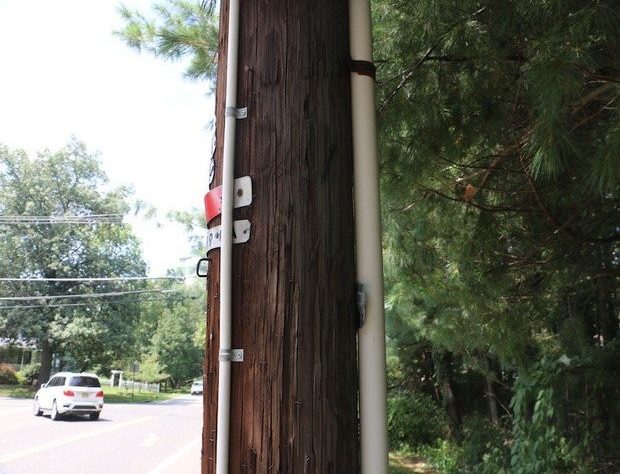
The township also agreed to pay for a Jewish group's legal fees to settle a federal lawsuit.
Mahwah officials will keep symbolic, PVC piping on utility poles in town, and the religious group that wants them there will replace or repaint them a color to better blend into the pole, according to a copy of an agreement reached this week between the two parties.
Mahwah officials agreed Tuesday night to settle with the Bergen Rockland Eruv Association over an expansion of a religious boundary that the township initially said was illegal under zoning laws. The eruv group filed a federal lawsuit in August after the township told a religious group that it had to remove its “lechis” from the poles.
The lechis are white PVC piping attached to utility poles to form an eruv, a symbolic religious boundary that allows Orthodox Jews to do certain things outside of the home on the Jewish Sabbath. Those actions could include carrying keys and books.
The settlement passed, despite the urging from multiple residents for the town to continue to fight the lawsuit.
As part of the settlement, the town will allow for the existing lechis to stay and be maintained and will “cooperate fully” when the maintenance of those poles might need township oversight. The parties will also “confer in good faith” regarding potential future expansions, including alternatives for any proposed eruv routes.
The agreement will allow the town and the religious group to continue working together, Council President Robert Hermansen said.
“This is going to be about still having an open dialogue between the two sides and without the attorneys. And that’s good for everybody,” Hermansen said.
The religious group agreed to recolor or replace all existing lechis within a year to match the poles they are on “as closely as possible.” The parties agreed to comply with the color selected by the utility company, Orange and Rockland Utilities, Inc., if it insists on a particular shade.
“Our lawsuit against Mahwah was filed to preserve and protect the eruv that has been up in a small portion of Mahwah since last summer, which has allowed many families to enjoy the same religious freedom as so many others throughout Bergen and Rockland counties and beyond,” Weil Partner Yehudah Buchweitz, counsel for the association, said in a statement.
“This settlement preserves and protects that eruv.”
Also in the settlement:
The town agreed to pay $10,000, or an amount both parties could agree on, in some of BREA’s attorney fees and litigation costs
The group will maintain the lechis without town funding
The town will pay to repair a lechi if a town official damages it
The group will pay for any damage to town property in the process of installing the lechis
The release of the settlement opened the floodgates for finger-pointing between town officials as to who was responsible for the high-profile issue in the first place.
“At the end of the day, the person who failed this community in all of this was the mayor,” Hermansen said of Bill Laforet, Mahwah’s mayor and Hermansen’s political foe. “And not once did he ever come out and protect our residents of the comments that were being said of our community. Not once.”
Laforet, in turn, blamed the council for the lawsuit.
“It would’ve been better had he paid attention at the beginning to what I and law enforcement officials warned him and the town council that this was the wrong path, rather lamenting about it as he was here today,” he said.
“Robert Hermansen today is like the arsonist returning to the scene of the fire with burnt fingers,” Laforet said.
Sara Jerde may be reached at sjerde@njadvancemedia.com.
Follow her on Twitter @SaraJerde.Have information about this story or something else we should be covering? Tell us: nj.com/tips
http://www.nj.com/bergen/index.ssf/2018/02/mahwah_says_the_eruv_can_stay_but_has_to_be_repain.html
